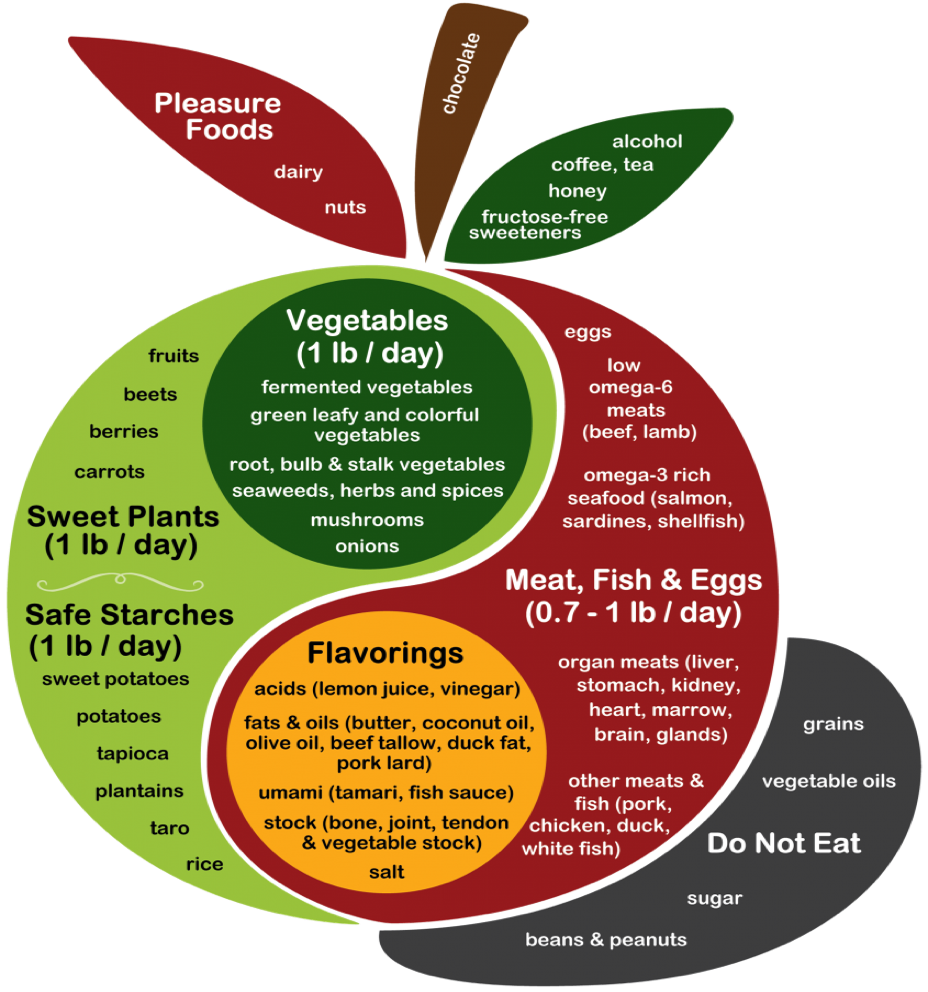Joseph E. Scherger, MD, MPH
A Stanford student interested in nutrition told me that Perfect Health Diet by Paul and Shou-Ching Jaminet of Cambridge, MA influenced her to eat healthy. This book was published in 2012 by Scribner and the Jaminets have a large following on their website and hold frequent events. They are both PhD scientists in other fields but chose to dive deeply into food science. Their approach most resembles a Paleo diet and is 65% plant based and 35% from meat and oils.
The Perfect Health Diet (PHD) is summarized in this apple diagram:
While I agree that this diet is very healthy by avoiding processed foods, grains and sweets, I find the PHD less than perfect. The Jaminets heavily promote “safe starches” including white rice and white potatoes. These are mentioned much more often than green vegetables. No mention is made of cruciferous vegetables such as broccoli. The science behind their promotion of these starches is weak. They criticize low carb diets and ketogenic diets even though their diet is a lighter version of these. Many of their case examples are people who followed very low carb and ketogenic diets but felt better on the PHD.
Their discussion of athletic performance is still carb based and ignores the science behind nutritional ketosis such as the work of Jeff Volek, Stephen Phinney and Eric Westman (see my previous Blogs and Suggested Reading on my website, leanandfitlife.com).
The Jaminets do not accurately describe the causes of obesity, more focused on omega 6 processed oils rather than the abundance of carbohydrates that drives hunger, overweight, obesity and type 2 diabetes.
Their treatment of cancer prevention is weak and ignores the role of a more vegan diet for preventing and even reversing cancers, especially the cruciferous vegetables.
Most importantly the Jaminets do not address the problem that much of our meat and other animal products are inflammatory to our bodies due to the modern practice of feeding animals corn and other grains rather than their natural foods. They do not emphasize the importance of grass fed meat and wild caught fish. They do not address the issues of arsenic contamination in rice and mercury contamination in fish.
In general the PHD is healthy but far from perfect. Given all the factors today in our modern food supply, I suggest a diet that is closer to 80-90% plant based would be healthier. The natural fats from nuts, seeds, healthy oils, and wild fish should be promoted as daily foods. I agree with the PHD recommendation of about 15% protein in the diet but I would also recommend that carbohydrates from whole fruit and vegetables be about 15% of the calories.
Like most nutrition book authors today, the Jaminets believe that their diet is right and all others are wrong. This is unfortunate and prevents the community of healthy nutrition authors from coming together and to have an honest sharing of ideas. We still have much to learn and no one could know a “perfect health diet” even if there will ever be such a thing. The leaders of the Institute for Functional Medicine (functionalmedicine.org) are doing a good job of monitoring the science and revising their diet recommendations based on new knowledge. There is no room for arrogance and the healthy nutrition community should be one of humility and sharing.
